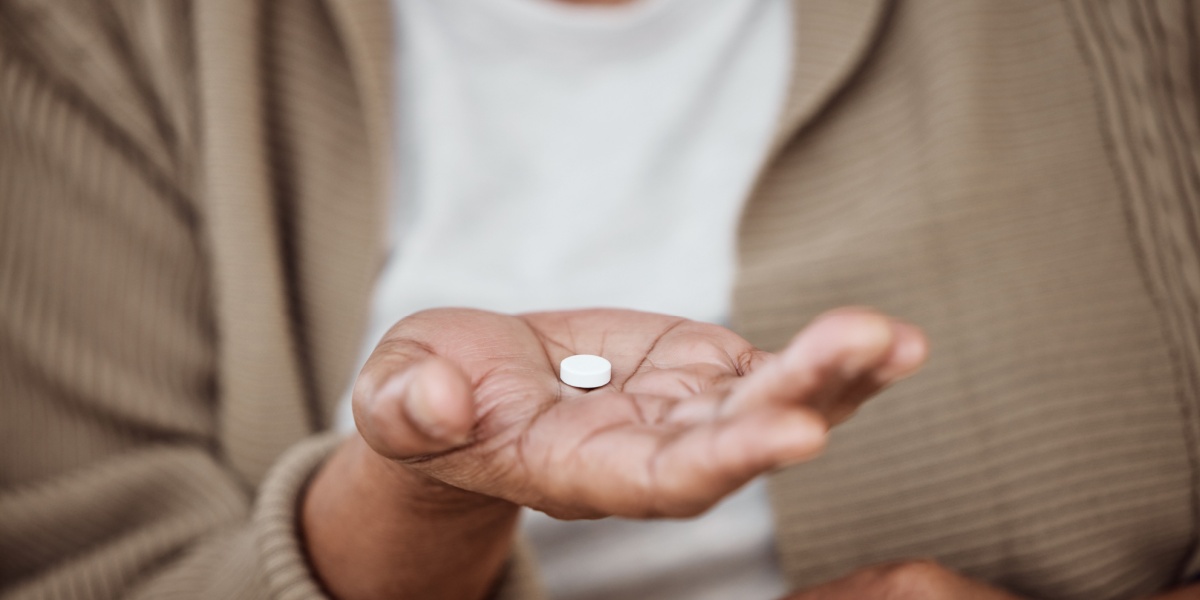Trazodone is an antidepressant medication that is often prescribed for off-label treatment, such as for anxiety disorders. It can be an effective anxiolytic while improving mood and reducing anxiety symptoms. It can cause side effects and may interact with other substances or medications. Always take trazodone exactly as prescribed by your doctor.
- Trazodone can be taken in doses between 75-300 mg per day for anxiety symptoms.
- Trazodone may be prescribed when someone is not responding to other treatments, experiences unpleasant side effects from other medications, or requires medication to manage sleep issues alongside anxiety symptoms.
- Trazodone is also used to manage stress and anxiety in dogs, including phobias and separation anxiety.

Trazodone medication for anxiety disorders
Trazodone is a serotonin antagonist and reuptake inhibitor (SARI), which changes the levels and activity of the neurotransmitter serotonin in the brain. Serotonin is associated with various functions, including regulating mood, sleep, and appetite. Because of this, medications that impact serotonin can help with different types of mental health conditions. [1][2]
Trazodone has been approved for use in the treatment of depression with or without anxiety since 1981. Because of its effects, trazodone is also used to treat several other physical and mental health conditions and symptoms. [1][3]
Trazodone is used to treat various types of anxiety disorders and related conditions, such as: [4][5]
- Generalized anxiety disorder (GAD)
- Panic disorder
- Agoraphobia
- Post-traumatic stress disorder (PTSD)
- Obsessive-compulsive disorder (OCD)
Trazodone dosage for anxiety
A normal trazodone dose to treat anxiety in adults is between 75-300 mg per day. This might be split into two to four doses throughout the day. The recommended maximum daily dose of trazodone is 400mg. However, when treating anxiety, the daily dosage is generally lower than this. [6][7]
Typically, the prescribing doctor will commence trazodone treatment on a low dose, allowing the body to adjust to the medication gradually, which can help reduce or prevent side effects. This will be slowly increased to find the most effective dose, which can vary from person to person.
When stopping trazodone treatment, it is recommended not to abruptly stop taking the medication, as this can cause withdrawal symptoms or discontinuation syndrome. Symptoms can include mood changes, sensory disturbances, headaches, agitation, trouble sleeping, and increased anxiety. To prevent this, it is advised to gradually reduce the dose. [3]
Is it safe to take trazodone for anxiety?
Trazodone can cause some side effects, particularly at the beginning of treatment. This includes sedation and drowsiness, stomach issues, and dizziness. However, studies have found that, compared to some other antidepressant medications, particularly tricyclic antidepressants, it may cause fewer unpleasant effects and be better tolerated. [1][6]
There is no evidence to suggest that trazodone is any less safe than other medications used in treating anxiety, despite potential side effects. However, research into trazodone use for anxiety is limited, so further studies are necessary. [5]
Is trazodone approved by the FDA for anxiety?
Trazodone is approved by the US Food & Drug Administration (FDA) for use in treating major depressive disorder (MDD). It is also used to treat several other conditions off-label, for purposes not FDA-approved. This includes anxiety disorders, sleep disorders, and eating disorders. [3][5]
Trazodone is not approved for these conditions due to limited evidence of its effectiveness. The clinical trials conducted to date have been too small to demonstrate significant results. [5]
Possible side effects of trazodone
Trazodone can cause side effects, particularly in the first few weeks of treatment. Common side effects include: [1][3]
- Drowsiness
- Stomach upset
- Dry mouth
- Changes in appetite
- Dizziness
Serious side effects of trazodone can include: [1][3]
- Trouble breathing
- Fever
- Severe confusion or cognitive impairments
- Seizures
- Unusual bleeding or bruising
- Painful, long-lasting erections
- Persistent vomiting or diarrhea
If side effects occur that persist longer than a few weeks or become problematic, contact your doctor immediately. You may require a change of medication or medical treatment.
Trazodone overdose
Taking a higher dose of trazodone than prescribed can increase the risk of overdose. In the event of an overdose, contact a medical professional immediately or call 911 in an emergency.
Symptoms of a trazodone overdose can include: [3]
- Drowsiness
- Vomiting
- Extreme changes in heart rate
- Heart failure
- Seizure
- Trouble breathing
Trazodone vs. other anxiety medications
Various medications can be prescribed to treat anxiety disorders. Effects might differ from person to person and the most beneficial treatment will often depend on the individual. Trazodone is an effective medication for anxiety symptoms in many cases, although alternatives might be preferable depending on side effects. [8]
Other medications that can be prescribed for anxiety include: [8][9]
- Other antidepressants, such as selective serotonin reuptake inhibitors (SSRIs)
- Beta-blockers
- Benzodiazepines
- Gabapentin or pregabalin
Compared to trazodone, SSRIs and other antidepressants can be equally as effective at managing anxiety symptoms. However, the side effect profile and tolerability of antidepressants can vary significantly. Some people do not respond well to SSRIs and may prefer trazodone, particularly when experiencing side effects impacting sleep or sexual functioning. [5]
Beta-blockers can help manage physical symptoms of anxiety disorders, particularly performance anxiety, but have demonstrated limited effect at treating GAD. Trazodone may be more effective for use in GAD. [5][7]
Benzodiazepines, such as clonazepam and lorazepam, can be very effective at treating symptoms of various anxiety disorders quickly, particularly symptoms impacting sleep. However, benzodiazepines are highly addictive, so should be used with caution and for short-term treatment. Trazodone does not cause dependence but may be less effective in short-term symptom management. [9][10]
Gabapentin and pregabalin have shown good effects in managing GAD and social anxiety disorder in high doses. These medications can cause some side effects, such as sedation, dizziness, and weight gain, although the same side effects can occur with trazodone. [9]
Other applications: Trazodone for dogs
Trazodone is also sometimes used to treat anxiety symptoms in animals, particularly dogs. It can be used for separation anxiety, phobias, appointments at the vet, or travel. Some pets may require long-term treatment to help manage ongoing anxiety symptoms. It can also be used for short-term treatment.
Side effects can occur, including vomiting, increased appetite, sedation, and changes in heart rate.
Doses will depend on the severity of the dog’s anxiety and their size. It should always be taken as directed by a vet. [11]


-guide-detail.jpg?v=1722503273)

-guide-detail.jpg?v=1722503242)